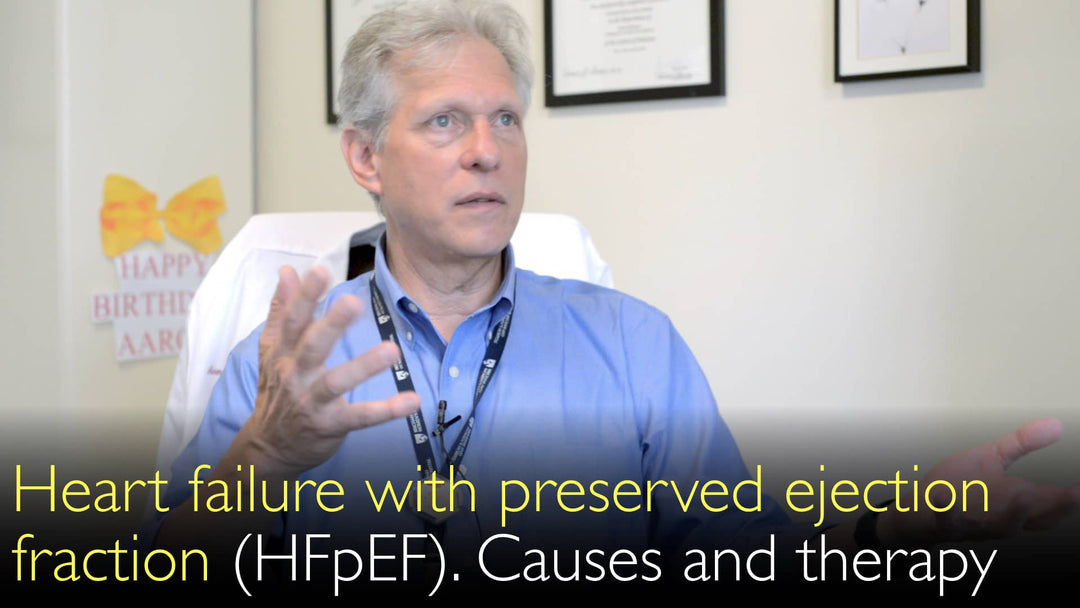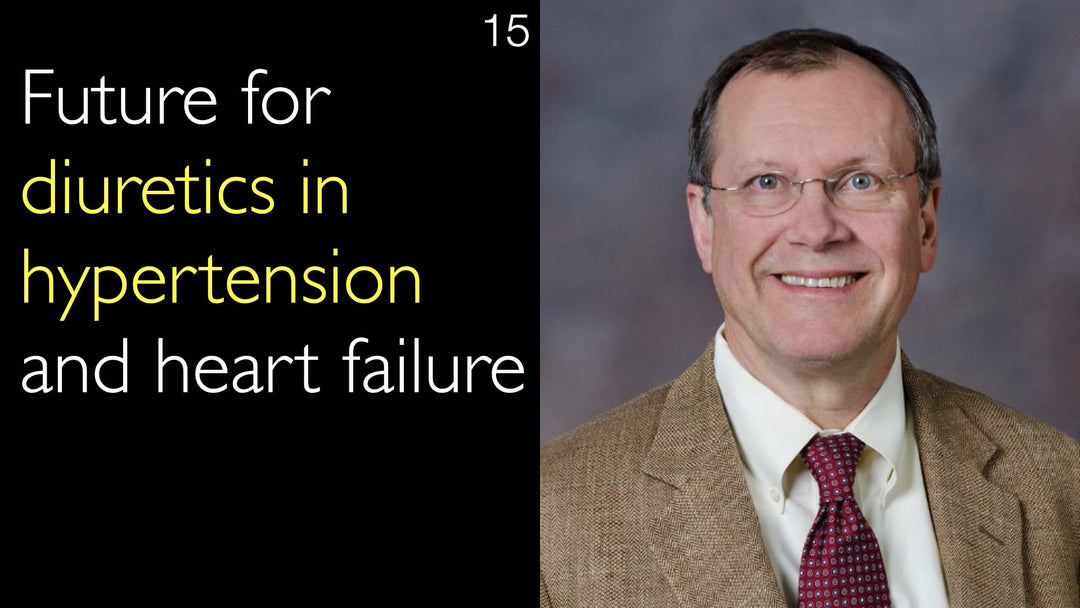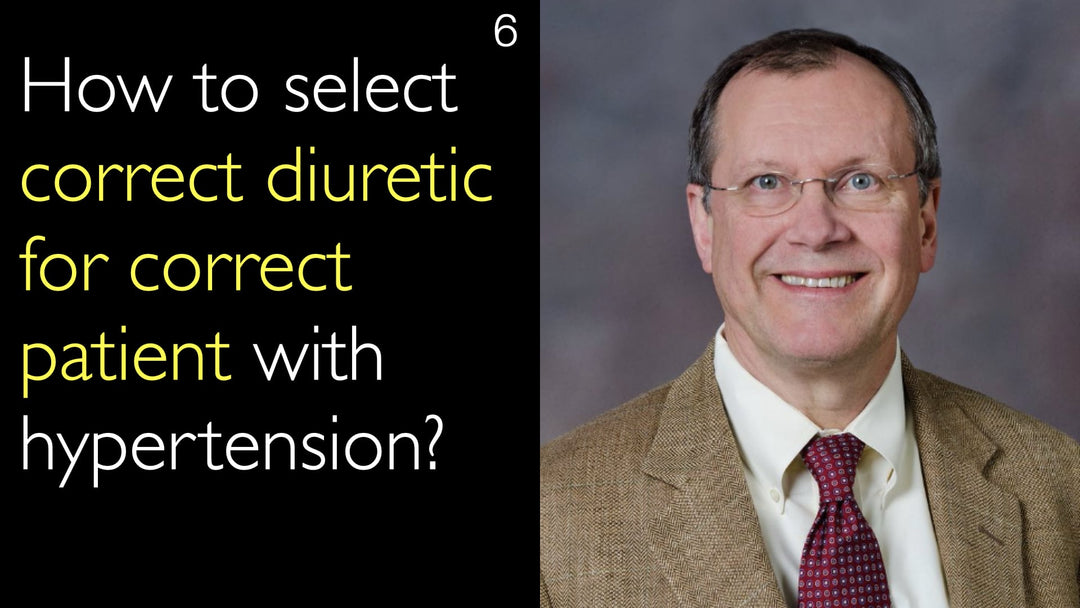Leading expert in heart and lung disease, Dr. Aaron Waxman, MD, explains heart failure with preserved ejection fraction (HFpEF). He details how HFpEF is a common type of heart failure. It is driven by metabolic syndrome and aging. The heart muscle becomes stiff and fails to relax properly. This leads to fluid buildup and high pressures in the heart and lungs. Dr. Aaron Waxman, MD, discusses the significant treatment challenges. He outlines the limited options available for patients with this condition.
Understanding and Managing Heart Failure with Preserved Ejection Fraction (HFpEF)
Jump To Section
- What is HFpEF?
- Causes and Risk Factors
- Symptoms and Physiology
- Treatment Challenges
- Medical Devices and Surgery
- Full Transcript
What is HFpEF?
Heart failure with preserved ejection fraction, or HFpEF, is a major type of heart failure. Dr. Aaron Waxman, MD, clarifies that HFpEF is also known as diastolic dysfunction. It is distinct from heart failure with reduced ejection fraction. This condition is currently one of the most difficult aspects of heart failure to treat. HFpEF is actually more prevalent than the reduced ejection fraction type.
Causes and Risk Factors
The development of HFpEF is strongly linked to aging and metabolic syndrome. Dr. Aaron Waxman, MD, identifies key risk factors. These include diabetes, high cholesterol (hyperlipidemia), and obesity. Over time, these conditions cause the heart muscle to become stiffer. This stiffness is the core problem in HFpEF. The heart's ability to relax between beats becomes severely compromised.
Symptoms and Physiology
The primary symptom of HFpEF is exertional intolerance, manifesting as shortness of breath. Dr. Aaron Waxman, MD, explains the physiology behind this symptom. A stiff heart leads to inefficient pumping. The kidneys respond by retaining fluid, which increases blood volume. This results in high pressures inside the heart's chambers, specifically the left atrial pressure and left ventricular end-diastolic pressure.
These elevated pressures back up into the lungs, causing breathlessness. If left untreated, the pulmonary blood vessels become stiff and thick. This condition is a form of pulmonary hypertension. Over time, this increased pressure can also impair the function of the right side of the heart.
Treatment Challenges
A significant challenge in HFpEF is the lack of clear, targeted therapies. Dr. Aaron Waxman, MD, outlines the current limited treatment approach. Doctors use diuretics to manage fluid overload. They also aggressively treat the underlying metabolic syndrome components. Some data suggests that phosphodiesterase 5 inhibitors like sildenafil (Viagra) and tadalafil (Cialis) may help. These medications can be beneficial for patients who have developed increased pulmonary vascular resistance.
However, Dr. Aaron Waxman, MD, emphasizes that beyond these options, effective treatments for the core disease process are lacking. This represents a major unmet need in cardiovascular medicine.
Medical Devices and Surgery
Medical device therapy offers little for HFpEF patients directly. Dr. Anton Titov, MD, asks about device and surgical options. Dr. Waxman confirms that while device therapy is rapidly advancing for heart failure with reduced ejection fraction, it is not a solution for HFpEF. Devices like ventricular assist devices (VADs) are designed for pumping problems, not relaxation problems.
Dr. Aaron Waxman, MD, also differentiates HFpEF from hypertrophic cardiomyopathy (HCM), which has a similar physiology but is a different disease. Patients with severe HCM may be candidates for a heart transplant. However, heart failure with preserved ejection fraction is rarely an indication for heart transplantation.
Full Transcript
Heart failure is not one disease. It’s important to diagnose heart failure type precisely for best treatment options. Shortness of breath is often the only symptom of HFpEF.
Dr. Anton Titov, MD: What is heart failure with preserved ejection fraction?
Dr. Anton Titov, MD: Why is it important to find the precise diagnosis of heart failure?
Dr. Anton Titov, MD: What treatment options are available for patients with heart failure with preserved ejection fraction?
Dr. Aaron Waxman, MD: Heart failure with preserved ejection fraction is also known as diastolic dysfunction. It is abbreviated as HFpEF. This is how people call heart failure with preserved ejection fraction. It is probably one of the most difficult aspects of treating heart failure right now.
Dr. Aaron Waxman, MD: Heart failure with preserved ejection fraction is more prevalent than heart failure with reduced ejection fraction. We think about systolic heart failure and congestive heart failure. This is what happens in heart failure with preserved ejection fraction.
Dr. Aaron Waxman, MD: People get older. Heart failure with preserved ejection fraction is often a complication of the metabolic syndrome, diabetes, cholesterol hyperlipidemia, and obesity. The heart starts to become stiffer. That stiffness increases with time.
Heart muscle starts to fail at relaxation. The relaxation phase of the heart contractility becomes compromised. The response to that is to build up fluid in the body system.
Dr. Aaron Waxman, MD: The kidneys start to retain fluid. Blood volume goes up.
Dr. Aaron Waxman, MD: With volume we get increased pressure inside heart chambers. Over time you start to see a rise in pressure in the left side of the heart at the end of the filling phase.
We see an increased left atrial pressure.
Dr. Aaron Waxman, MD: We see an increased left ventricular end diastolic pressure. That in itself creates an inefficient pumping system.
Patients with heart failure with preserved ejection fraction have exertional intolerance. They have shortness of breath with physical exertion because of that.
Then over time there can be an increase in that pressure back-fill into the lungs.
Dr. Aaron Waxman, MD: If not treated aggressively, the vessels in the lungs start to become stiffer and thicker. It is similar to any other form of pulmonary artery hypertension. Then you start to impact right ventricular function.
One of the difficult things is this. We don't have any clear targeted therapy for heart failure with preserved ejection fraction. We only can use diuretics. We can treat metabolic syndrome.
Dr. Aaron Waxman, MD: There are some data that suggests sildenafil and tadalafil could help patients with heart failure with preserved ejection fraction. Phosphodiesterase 5 inhibitors could be helpful in patients who already have had a change in their pulmonary vascular resistance.
We can treat increase in pulmonary vascular resistance with Viagra and Cialis. But otherwise we cannot help these patients. We don't have a good treatment at this time for heart failure with preserved ejection fraction.
Dr. Anton Titov, MD: Is there anything for HFpEF therapy from a medical devices standpoint?
Dr. Anton Titov, MD: Can you treat heart failure with preserved ejection fraction with implanted medical devices?
Dr. Aaron Waxman, MD: Because medical devices in heart failure are developing quite rapidly. There are even surgical approaches to heart failure now. There is no effective therapy for heart failure with preserved ejection fraction.
Obviously, for reduced ejection fraction there are lots of device treatment options. There is a growing device therapy options for left-sided heart failure.
Dr. Aaron Waxman, MD: There are ventricular assist devices. There are other devices that create augmented blood flow. But for HFpEF itself we have little targeted therapy.
Dr. Anton Titov, MD: You can look at it from a physiologic standpoint. Patients who have hypertrophic cardiomyopathy often have similar physiology. But it is extreme compared to heart failure with preserved ejection fraction.
Dr. Aaron Waxman, MD: In those patients it is a different disease.
Dr. Aaron Waxman, MD: Patients with hypertrophic cardiomyopathy are candidates for transplant. But for HFpEF itself generally that is not a disease state that we think about heart transplant. Heart failure with preserved ejection fraction is rarely an indication for heart transplantation.







